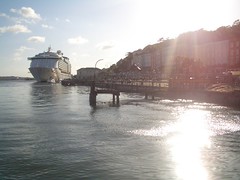Sunday, November 11, 2012
Remembrance Day - a tale from the Somme....
THEIR NAME LIVETH FOREVER MORE....
On Remembrance Day it is appropriate to reproduce this story below, which in a small way, linked the Commodore Hotel to the Battle of the Somme in World War 1.....
A CORKMAN DIES ON THE SOMME
'September 1916 and the 36th Ulster Division and the 16th Irish Division are engaged in the bloody advance across the Somme. They advance some 500 yards to take and hold enemy positions beyond the shattered village of Guillemont. Of the 2,400 men engaged in the advance some 1,150 fall. Among the advancing soldiers of the 16th Irish Division are men of the 7th Leinster Regiment.
After their advance, non-combatant labour battalions are sent into the battlefield to clear up the mess left by the fighting soldiers. They clear away abandoned trenching tools and wire cutters, discarded equipment and bits and pieces of dead soldiers. It is gruesome and arduous work. Among their number is an Englishman, Private George Wiles of the Royal Engineers. As he scurries across the blood soaked ground he comes upon a great crater and at the edge of it, "as if resting after a long walk" is the body of a well built soldier from one of the Irish regiments. The Englishman is struck by his noble posture, for the dead soldier was a big man. Even by modern standards he would be taller than average, by the standards of 1914-18 he was big indeed. The Englishman goes to the body. He has seen many such dead, too many, but he is touched by the sight of this particular dead Irishman. He takes his knife and cuts open the breast pockets of the fallen soldier. From the bloody and muddy mess he takes a letter sent to the fallen man from Ireland, from his wife in Queenstown, County Cork. He buries the fallen soldier and takes from the ruins of a nearby church a piece of rubble from the destroyed structure. There are ancient crosses cut into the stones, five such crosses, and he marks the grave of the fallen Irishman with the broken stone of the church.
Later the same ground, cleared by the labour battalions, would again become a blood soaked battlefield, pounded by artillery and fought over by opposing armies. The stone marked temporary grave of the Irishman would be lost. Forever lost and he, thereafter, would only be remembered by a name cut into the Somme memorial at Thiepval in Flanders.
Later still the Englishman, alone in his own trench, by candlelight, would write a powerful and moving letter to the grieving wife of the Irishman. He poured his heart into the letter, using all the paper he had. Ten pages would he write, in pencil, telling her how he found her dear husband and what he had done with his fallen body.
The dead Irishman was Christopher Cole, Private Cole of the 7th Leinster Regiment. He came from what was then Queenstown in County Cork. Before the war he had been the manager of the Commodore Hotel in Queenstown. He had seen the innocent civilian bodies being brought ashore in Queenstown and into the hotel in May 1915, after the sinking of the Lusitania. Perhaps it is that experience that caused him to join the Leinsters to fight in Flanders.
He was such a handsome man and his dear wife had, with considerable talent, drawn his pencil portrait from which, even after all this time, you can still sense his great size and presence.
The Englishman Wiles wrote of him that, "....I came across this fellow in a shell hole (a very large one) & passed him as I passed others that lay about & something struck me to go back and see him, as he lay there as if resting from a long walk. His statue marked me very much indeed he looked so smart & a lovely build,,," " I hope dear madam you will forgive me of taking liberties with your dear husband's body. But you can rest assured (I will give you my word of honour) that he is buried & I buried him the best I could. Not so well as some but better than thousands."
It is by any measure a touching act of an ordinary English soldier for a fallen Irishman, and it must have brought enormous comfort to the grieving widow. Indeed, until she received the letter, Mrs. Coleman from Cobh had no idea what had become of her husband. She had been advised he was missing after the September battles and desperate for news of her dear husband, had travelled to Dover in the hope that he would be amongst the wounded returning from the Somme into the network of military hospitals across the South of England. It was of no avail. She advertised for news of him in the Daily Herald again without response. The letter of course confirmed her very worst fears but it must also have been a source of great relief and it is clear that she was so appreciative of the kind words of Private Wiles that she replied to him asking if he was in need of anything that she could send him to ease the discomfort of life in the trenches.
After the war, or perhaps before it ended, the Coleman's left the Commodore Hotel and left Ireland altogether, emigrating to Canada, no doubt from a ship leaving from the quayside opposite their Cobh home. The ten page pencil written letter is now held by the surviving Coleman family, in Canada. No one has ever traced George Wiles.'
This indeed was a remarkable tale and was given to us a number of years ago along with a copy of the pencil portrait of Christopher Cole. On the day that's in it today, it is fitting to retell it here once more!
Subscribe to:
Post Comments (Atom)



No comments:
Post a Comment